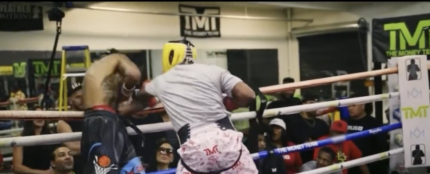In 1959, Miles Davis released his magnum opus, Kind of Blue, an album that is widely considered his defining glory.
The album used a cornucopia of popular musicians who all played fealty to Davis supposed jazz prowess, unconventional work process and trailblazing ambition. It defined an era and also confirmed the genius of the complicated trumpeter from the Midwest.
Enter former concert promoter turned boxing adviser, Al Haymon. The maestro of usurpation took the concert business by storm while still at Harvard, learning how to crowd source investment capital.
After undergrad and Harvard Business School achievements, the Clevelander realized what the fragmented concert industry lacked in the touring business and created a slew of companies to unify the fragments.
He crafted blockbuster shows that synthesized musical genres and its stars. He sold out at the box office and concentrated on cities that were in closer proximity to each other, taking advantage of a tighter transportation routing.
In 2015, Haymon created a new boxing platform called Premier Boxing Champions, shattering the traditional business model of the boxing business.
Normally, promoters put on fights, hopefully with top talent, and are able to secure television deals with a premium cable channel like HBO or Showtime, who pays the promoter a licensing fee to air the programming to their subscriber base.
The network pays for all of the production costs associated with the television broadcast, and the two entities of promoter and television are happily married.
Haymon obliterated that model by brokering the lifeblood of the boxing business: TV dates.
Taking a cue from the Ultimate Fighting Championships self-funded pay-per-view model, Haymon instead decided against a license-based arrangement, opting to purchase the air-time from broadcast networks like CBS, NBC, FOX and cable outlets like Bounce TV, Fox Sports 1 and ESPN where he would in turn control the advertising revenue.
Like a superior chessman though, Haymon had to make a series of moves before he could again usurp the common order of things and the first was consolidation of power.
Starting with 1992 Olympian and former two-time welterweight and two-time junior middleweight champion, Vernon Forest, Haymon began advising professional fighters and eventually created the biggest boxing advisement group in the business.
Haymon virtually advises all the major champions of the sport and notables with his biggest success story being Floyd Mayweather, Jr., who he helped catapult into super stardom when he negotiated the dissolution of his former promoter, Bob Arum and Top Rank, from Mayweathers life for $750,000 in 2006.
(Haymon, Center, with clients Andre Berto (L) and Floyd Mayweather, Jr. (R), Photo Credit: thesportsfanjournal.com)
Accordingly, the ire of being the change-maker has rolled upon Haymon – who purposely keeps a notoriously low profile, rivaling only that of tooth fairy or The Usual Suspects Keyser Soze – in the form of lawsuits from his new promoter competitors.
Some promoters, like Miles Davis’ accompanying musicians, lend their promoter’s licenses and local operations team to be a part of the now shrinking pie of available TV dates and “premier” fighters. Others have taken their angst to the courtroom.
Both Top Rank and Golden Boy Promotions filed suits against Haymon and Premier Boxing Champions, claiming that he has broken the Muhammad Ali Boxing Reform Act. The federal law was introduced in 1999 and legalized in 2000, making it illegal for a fighter’s manager to also act as a promoter. Top Rank settled its multi-million dollar lawsuit against Haymon and Premier Boxing Champions last month according to the L.A. Times.
One cannot look out for a fighters interests if protecting their own interests as a promoter, and both rival promoters feel that Haymons cloak and dagger show of labeling himself as an adviser instead of a manager has finally caught up to him.
(Josesito Lopez and Andre Berto, Photo Credit: Spike TV)
In addition, the shareholders of the Kansas City based Asset Management Group of Waddell & Reed, which invested the venture capital of nearly $500 million needed for the start-up recently filed a federal lawsuit against Haymons companies. They’re looking to recover a reported $300 million and even as much as $925 million in losses and other damages.
Like Miles Davis who was from Illinois, Haymon came from a well-to-do entrepreneurial middle class Mid-western family and went to the higher annals of education to figure out his own path. Along the way, Bobby Haymon, Als brother, became a boxer that went an unceremonious but respected 21-8-1, losing his last fight in 1978 in the 3rd round to future superstar Sugar Ray Leonard.
If Premier Boxing Champions is Haymons magnum opus like Davis Kind of Blue, which went on to sell over four million records, only the dissolution of lawsuits and a proven profitability rivaling his former concert glory days will determine where the Haymon boxing legacy will stand.






